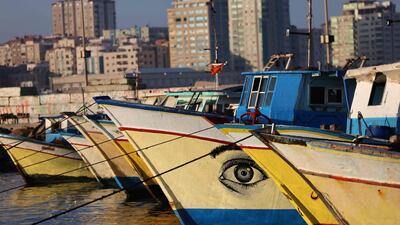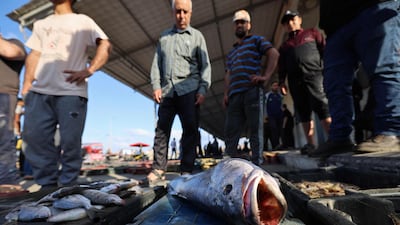Gaza’s fishermen have returned to sea after a fragile ceasefire with Israel ended 11 days of air strikes on the Palestinian territory this month, but their livelihood remains precarious in the face of an Israeli blockade and restrictions.
“We started to breathe again. We used to come to the port and leave the port afraid that we wouldn’t go back to the sea,” said Mahdi Abu Ryala, 47, repairing nets on Gaza's Mediterranean shore.
“During the war, we used to come to the port to check on the boats,” said Mr Abu Ryala, who bailed out one of the family’s leaking boats each day to prevent it sinking.
According to the Gazan fishermen’s committee, about 5,500 workers were left without an income after the latest fishing ban imposed on May 9, a day before fighting broke out between Israel and Gaza militants.
Sitting beside his brother, Mohssan Abu Ryala, 48, said 80 members of their family depend on fishing.
“If I work today, I will have money to eat. If I don’t work, I will not have money,” he said.
The brothers were speaking to The National having just spent 12 hours at sea, with 15 fishermen on two boats working together.
They said their catch would earn the group about 1,500 Israeli shekels ($460), but more than half of it would be used to cover costs such as fuel.
“It’s better than nothing,” Mohssan Abu Ryala said.
About 90 per cent of Gaza's fishermen live below the poverty line and earn less than 700 to 900 shekels a month, according to a World Bank report last year.
Their trade is controlled by Israel, which imposes a limited fishing zone and often bans boats altogether during flare-ups with Hamas, the group that rules Gaza.
Such external regulations, frequently changed, are “generating serious implications for safety at sea and posing major challenges in developing a blue economy”, the World Bank said.
Zakaria Bakr, head of the Fishermen Union Committees in Gaza., said they were bearing the brunt of the 14-year blockade on Gaza by Israel and Egypt.
“I know that all of that is political. But the result of it is so catastrophic for the lives of fishermen,” he said.
Zakaria Bakr, head of the Gazan fishermen's committee
“The fishing sector, which is supposed to help the national income, in general, now needs help and aid to continue.”
Besides the repeated bans on fishing, Israel's navy has detained about 700 fishermen since 2006, he said.
Boats have been confiscated and returned damaged and without their engines, Mr Bakr said.
Mohssan Abu Ryala said one of their vessels was held for more than two years.
The brothers were painstakingly repairing emerald green nets, a task they say is necessary because of Israel's restrictions on imports of fishing equipment.
“There are no spare parts,” said Mr Bakr, estimating the sector was in need of 300 new boat engines.
“They are taking those motors from trucks – they rebuild them to be suitable for the sea,” he said. “It uses lots of fuel, it will break early, it needs maintenance all the time.”
Working with makeshift and dilapidated equipment, the fishermen are permitted to go up to six nautical miles from the shore.
Mr Bakr accused the Israeli navy of encroaching on the fishing zone last week and firing water cannons at boats within two miles of the coast.
“What is the meaning of giving me six miles, but in half of those miles, you can kill me, you can attack me, you can arrest me?” he said.
The Israeli military would not comment on accusations that its vessels pursued Gazan fishing men and fired at them.
The reopening of the fishing zone “is part of the civilian measures approved by the political echelon, which are conditional upon the preservation of security stability”, said a spokesman for Cogat, the military wing dealing with civilian affairs.
Israel has been accused of inflicting collective punishment on the fishermen, a charge the military would not comment on.
With no signs the current ceasefire will lead to a lasting peace deal, Gaza’s fishermen are powerless to change the situation at sea.
“In the end it’s a battle between two sides; one of them is strong and one of them is weak,” said Mr Bakr. “A fisherman who is following the fish, and a navy full of weapons.”












